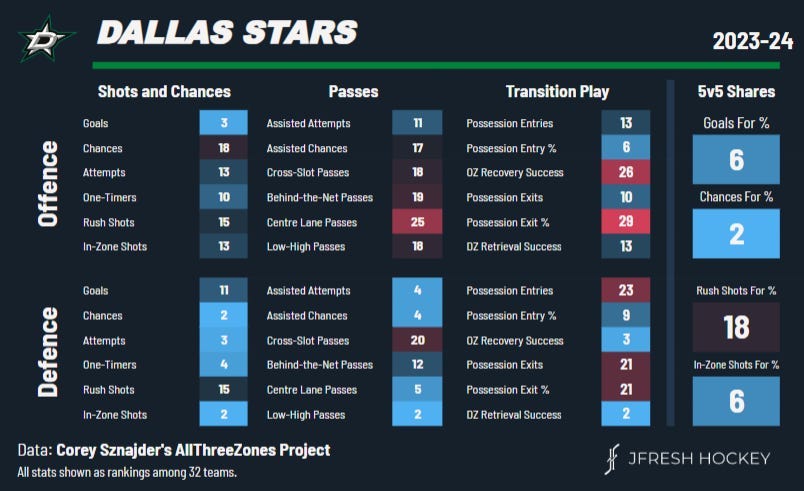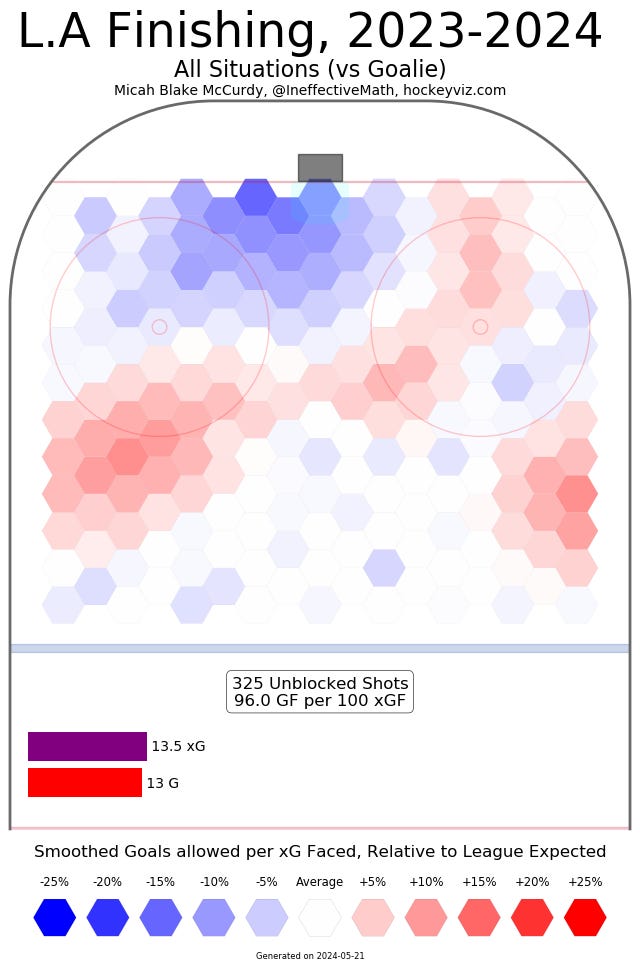2024 Western Conference Final Preview: Into the weeds with the Stars vs. Oilers
And here...we...go. Like it's 1999!
By now the book on Dallas is written: with Jake Oettinger firmly in-the-zone, the Stars are a four-line forward core, and a top four of the best two-way defenders in the game. They’re, in a word: perfect. And now their trail of fallen rivals includes the former 2023 Cup champs, and the former 2022 Cup champs. Not a bad resume. In fact, it’s almost too good.
And that’s the thing: perfection guarantees nothing in the playoffs. So that’s where the Stars now find themselves, in the rarified air of finding whether or not their season-long process can convert into playoff wins when they need them, or whether or not the hockey gods will deny them at their most crucial hour.
I think people, especially Stars fans, likely see this as a step down for the Stars. I think that’s fair insofar as Vegas and Colorado were great teams at the height of their powers (well, less so Colorado). However, this is a fool’s errand. Edmonton was a much better team than Vancouver, but it took them seven games. There are different ways to read that: either Edmonton struggled to put away an inferior opponent, or Vancouver was simply a lot better than given credit for.
My read is that the better team doesn’t always win. A best-of-seven is a small sample size, so the window for teams to harness their process and performance into guaranteed victory is slim, and the margins small. Because of that, Edmonton deserves the same respect owed to all playoff opponents.
However, there’s another element here. And it’s very simple: Edmonton is really, really good. Outcome bias is a thing, and because of that, their goaltenders letting in soft goals here and there make them look less defensively capable than they are. The Oilers owning over 57 expected goal share as a team was the fifth-best mark in the analytics era. Translation: if Stuart Skinner or Calvin Pickard magically unlock Adin Hill mode, then this matchup is suddenly very interesting, and very even. But to what degree?
Let’s break it down!
You can read my preview of the Vegas series here and my preview of the Colorado series here if you’re keeping track. I’ll follow the same formula: one broad preview and prediction for subscribers of all types, and a level deeper along with my ‘three expected stars of the series’ for the sickos i.e. paid subscribers.
The Stars: At a Glance
Great offense, elite defense, and focused goaltending: they’ve fit the profile so far of a genuine contender, and a lot of this data — which already valued Dallas highly — has only gotten better with the additions of Chris Tanev and Logan Stankoven.
For example, the Stars didn’t rank as a great passing team, as you can see, but I feel like that’s largely changed. Obviously, the biggest adjustment is Roope Hintz’ status, and whether he even comes back to Playoff 100. This, to me, is the x-factor. Hintz was already having a tough playoffs. And no, scoring a bunch of points one game did not magically convince me he was about to “turn the page.” The thing about Hintz is that even when he’s unproductive, he has still has value given his defensive acumen. In other words, whether Hintz is healthy or not, he’s an x-factor no matter what. It’s hard to imagine Dallas going far with their number one center in a funk.
But that’s why the Stars are elite: they’ve been able to manage because any new combination seems to generate new chemistries. I thought for sure Mason Marchment with Matt Duchene and Joe Pavelski would be a complete dud. Instead they dominated, even before they beat Nathan MacKinnon in double overtime to seal it. I don’t expect them to continue looking like that, but it’s certainly a positive.
To me, where the forwards shine is in their defense. Yes, the Stars have an elite top four, but this was my big takeaway in my film room analysis (paid) of how Dallas shut out MacKinnon — the forwards did a great job of tracking back — which was the way they’ve been gapping up as a five-man unit.
While MacKinnon is different than Connor McDavid in some obvious and not-so obvious ways, the duty to help Dallas’ blueline will be even more tense. Why? Not only is McDavid a few quick twitch muscle fibers faster than MacKinnon in a straight line, but he’s also better, and more complete. McDavid might not be a Selke candidate, but he doesn’t float in the defensive zone like MacKinnon, and can win one-on-one matchups with or without his supernatural speed.
In many ways, the assignment continues to get harder and harder for Dallas.
The Oilers: At a Glance
Newsflash: the Oilers are good.
Whether it’s shooting, passing, counterattacking, breaking out, or attacking in unison, Edmonton’s offense operates at the highest levels. This is not just the McDavid show either. The combos of Ryan Nugent-Hopkins with Zach Hyman next to McDavid, and Leon Draisaitl on a separate line really separates Edmonton from Vegas or Colorado.
In fact, it’s worth stressing just how important Draisaitl is. With 24 points through 12 games, he’s actually outproducing McDavid. His 5.05 points per hour at even strength is the third-best playoff mark in the analytics era. And that’s not even counting whether Adam Henrique and Corey Perry return. Granted, their bottom six is just garden-variety goulash, but a lot of these forwards can scoot (Janmark!), and play within their role even if they’re not a threat to score. The pressure on Dallas to defend will be higher than ever.
I’ll talk more about Edmonton’s blueline in the paid section, but I want to note that the Oilers’ blueline is a good example of why it’s important to distinguish between defense and goaltending; between chance suppression and finish suppression; between sequence defending and opportunity defending; etc. They’re not that bad; it helps that coaching has recognized the limitations of pairing Darnell Nurse with Cody Ceci. But broadly speaking, they’re very good at defending teams in transition, especially entries, they’re good at defending the cycle (in-zone shots), less good at defending the rush but still legible, and in general bely their own reputation as a “bad defensive team” thanks to — pardon my French — horseshit goaltending.
Here was Edmonton’s saving heat map in the regular season.
Here it was in Round 1 versus LA.
And here in Round 2 versus Vancouver.
Edmonton has allowed 10 low danger goals against so far this playoffs; a league worst. The common denominator is that if you fire from the left point, for whatever reason, you’re home sailing. There is a discussion here about what exactly is going on, but when your job is to tend the net, and you can’t tend the net against something that keeps beating you, then I don’t know how much blame genuinely belongs on team defense. So where does that leave us?
Prediction
Dallas in five.
(Previous Predictions: Dallas in six versus Vegas, and Dallas in six versus Colorado) Keep in mind, close and competitive are two different distinctions. For example, Vegas was both. Colorado was more close rather than competitive, where I’m expecting this series versus Edmonton to be competitive only. As in, the Oilers will be live dogs from period to period. Dallas will never feel safe. But the edges will accumulate.
Part of the reason why I’m fairly confident is that Edmonton has to deal with the problems Dallas creates for them, along with the problems they create for themselves. Draisaitl is a phenomenal player, but at even strength, he plays next to Evander Kane and Dylan Holloway: two players who fail to optimize his game for different reasons — Kane because he’s just not a good player anymore, and Holloway because he’s inexperienced and has a low ceiling. (I love his game personally, though, for what it’s worth.)
In that way, Edmonton will suffer a similar fate as Colorado in that they’ll be driven be one line, with two critical exceptions: their blueline isn’t as good, and their goaltending is a lot worse on paper. “But you said competitive?” Correct. The reason is because Edmonton has an elite power play. Their penalty kill isn’t too bad either (meanwhile, I don’t like Dallas’ top unit all that much when healthy). Beyond that, I’d expect Skinner to keep his head above water. You know how this story goes: “goaltender with a bad resume reverses the narrative for the playoffs.”
It won’t be enough, but it’ll be enough to make this an exciting series that when all is said and done — and will be super competitive despite the misleading outcome. (How fitting that this is exactly how I would describe the late 20th-century playoff games between these two teams.)








